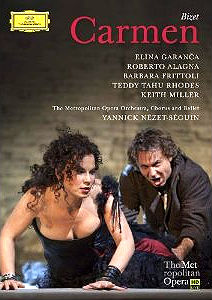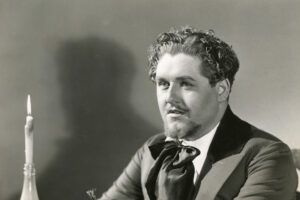
The interpretation of Carmen by Latvian mezzo-soprano Elina Garanca has been much debated, many finding her cold and remote, others admiring her subtly smoldering quality. A new Deutsche Grammophon DVD
documenting the Met’s January 16, 2010 performances offers us an opportunity to examine the gypsy in close-up.
This is certainly not the lusty, passionate, mercurial Carmen of many interpreters. There is no overt hip-swinging sexuality here. It strikes me that this is a Carmen for the head, and not the gut—the most intellectual Carmen of my experience. Rather than following her whims and desires, this Carmen acts with a glorification of self worthy of an Ayn Rand hero. Making decisions based on self-interest, she seems manipulative rather than passionate with her lovers. I found her fascinating, though she seemed charming rather than sensual; obsessed with fate rather than accepting; and, ultimately, suicidal rather than defiantly free.
Fortunately, it is a gorgeously sung Carmen. Garanca’s chocolaty mezzo has wonderful evenness of tone from top to bottom; one never hears an abrupt register shift. She has thrilling high notes and powerful, menacing low ones. She manages to sound sensual, even if it is not reflected in the physical characterization. She has a powerful stage presence and understands the power of physical stillness—there’s nary an excessive gesture.
Roberto Alagna, who seems to be having a vocal renaissance of late, is a powerful, deeply felt Don José, providing a stark contrast to Garanca’s steely Carmen. This is an unusually nuanced, three-dimensional portrait, ranging who from boyish exuberance in Act One to almost painfully raw intensity in the final scene. Alagna knows how to shape a French phrase, and he is in extremely fine vocal form here.
Teddy Tahu Rhodes has the looks, charisma, and physicality for Escamillo, but the voice seems a bit thin and small to convey the toreador’s confident allure. Barbara Frittoli was a dewy-voiced but very matronly Micaëla (perhaps Don Jose really has a thing for mother types?). Keith Miller’s acting skills made Zuniga far more interesting than one expects.
The Richard Eyre production is very beautiful, in fact way too beautiful. Perhaps it was the close camera work, but I was struck throughout by how clean everything was. Seville is colorful, but looks as if it’s been sterilized. The clothes look freshly laundered, the streets clear of dirt and debris, and even the mountain hideout is a lovely blue-shaded spot. Instead of the blood, sweat, and tears expected of a Carmen, Eyre has managed a body fluid-free production, making Garanca’s two token attempts at washing (legs and pits) seem unnecessary. Also undercut is the sense of flowing, earthy passion that is necessary to the success of any Carmen. It was not the performances that seemed cold and remote, it was the production itself.
Happily, conductor Yannick Nézet-Séguin leads the orchestra and singers with tremendous energy and precision. Nezet-Seguin exudes joy on the podium, and draws a stirring, fast-paced performance from the wonderful Met Orchestra. His touch with both the light and dark music of Bizet was masterful. I hope he will return to the Met with regularity.
This DVD version of Carmen is ultimately one to be admired rather than loved. It is a production that is always interesting; however, only Alagna’s gutsy performance grips the emotions.



























Comments